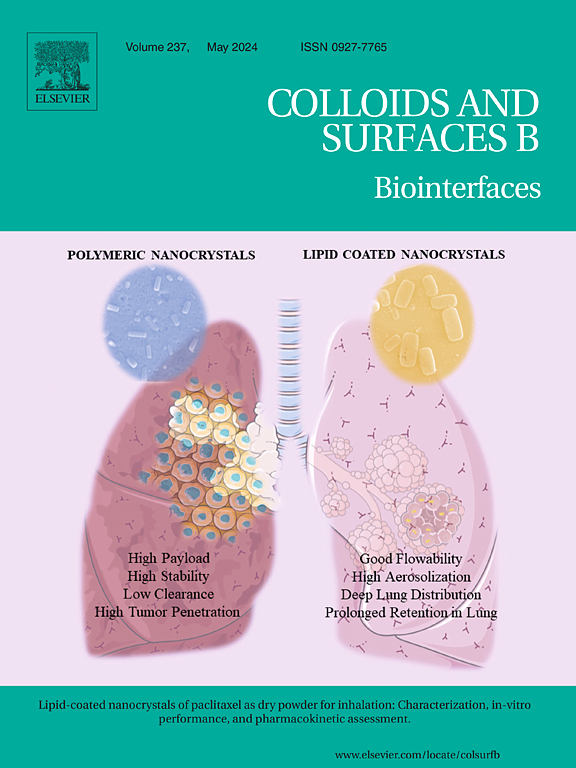Macrocycle-based self-assembled amphiphiles for co-delivery of therapeutic combinations to tumor
IF 5.4
2区 医学
Q1 BIOPHYSICS
引用次数: 0
Abstract
For tumor treatment, the efficiency of single chemotherapeutic agent is generally limited and the traditional combination chemotherapies frequently result in the aggravation of side effects. Herein, an amphiphilic pillararene-based self-assembled nanoparticle (APSN) composed of hydrazide-pillar[5]arene (HP5A-6C) that achieve effective co-delivery of therapeutic combinations was reported. Through integrating multitudinous macrocyclic cavities into a single nanoparticle, the APSN could co-load two antitumor drugs, cisplatin (CP) and nitrogen mustard (NM) via host-guest interactions. A serious of safety tests preliminary demonstrated that blank carrier APSN had good biocompatibility. Cytotoxicity assay verified that co-delivery system CP+NM@APSN could exert a synergistic antitumor effect at the cellular level. In vivo studies demonstrated that CP+NM@APSN could not only improve chemotherapeutic outcomes in tumor-bearing model mouse but also alleviate two medications-related side effects. These favorable findings were attributed to the formation of ternary supramolecular assembly that benefited from an enhanced permeability and retention effect. © 2024 Elsevier Science. All rights reserved
基于大环的自组装双亲化合物,用于共同向肿瘤输送治疗组合物。
在肿瘤治疗中,单一化疗药物的疗效普遍有限,而传统的联合化疗往往会导致副作用加重。本文报道了一种由酰肼-柱[5]炔(HP5A-6C)组成的两亲性柱[5]炔自组装纳米粒子(APSN),它能实现有效的联合给药。通过将多个大环空腔整合到单个纳米粒子中,APSN可通过主客体相互作用共同负载两种抗肿瘤药物--顺铂(CP)和氮芥(NM)。一系列安全性测试初步证明,空白载体 APSN 具有良好的生物相容性。细胞毒性试验证明,CP+NM@APSN 共给药系统可在细胞水平发挥协同抗肿瘤作用。体内研究表明,CP+NM@APSN 不仅能改善肿瘤模型小鼠的化疗效果,还能减轻两种药物相关的副作用。这些有利的研究结果归功于三元超分子组装的形成,它得益于增强的渗透性和保留效应。© 2024 爱思唯尔科学。保留所有权利。
本文章由计算机程序翻译,如有差异,请以英文原文为准。
求助全文
约1分钟内获得全文
求助全文
来源期刊

Colloids and Surfaces B: Biointerfaces
生物-材料科学:生物材料
CiteScore
11.10
自引率
3.40%
发文量
730
审稿时长
42 days
期刊介绍:
Colloids and Surfaces B: Biointerfaces is an international journal devoted to fundamental and applied research on colloid and interfacial phenomena in relation to systems of biological origin, having particular relevance to the medical, pharmaceutical, biotechnological, food and cosmetic fields.
Submissions that: (1) deal solely with biological phenomena and do not describe the physico-chemical or colloid-chemical background and/or mechanism of the phenomena, and (2) deal solely with colloid/interfacial phenomena and do not have appropriate biological content or relevance, are outside the scope of the journal and will not be considered for publication.
The journal publishes regular research papers, reviews, short communications and invited perspective articles, called BioInterface Perspectives. The BioInterface Perspective provide researchers the opportunity to review their own work, as well as provide insight into the work of others that inspired and influenced the author. Regular articles should have a maximum total length of 6,000 words. In addition, a (combined) maximum of 8 normal-sized figures and/or tables is allowed (so for instance 3 tables and 5 figures). For multiple-panel figures each set of two panels equates to one figure. Short communications should not exceed half of the above. It is required to give on the article cover page a short statistical summary of the article listing the total number of words and tables/figures.
 求助内容:
求助内容: 应助结果提醒方式:
应助结果提醒方式:


